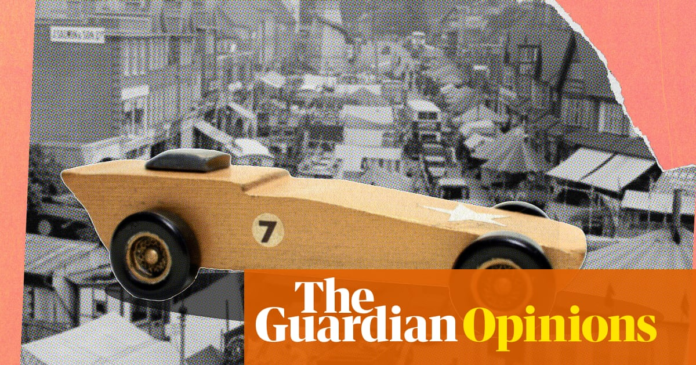Please bookmark for future updates
Six decades on, in my mind’s eye I can still walk around those rooms and hear my parents’ voices
It’s odd – and revealing – that 62 years after leaving the north London flat where I was brought up, I still think of it as home. I can still remember the telephone number: Pinner 1826.
I can walk round the flat in my mind, running my hand over the “distemper” on the lavatory wall, Paris wallpaper on another. I can hear the “geyser” spluttering hot water into the bath, smell the dying cat on my bed with its red “hospital” blanket, see the man peeing on the moon on an inn sign, in Bruegel’s painting, Netherlandish Proverbs, on our front-room wall.
My parents, Harold and Connie, had moved to Pinner from London’s East End. My mother liked living in Pinner, but my father was irritated. We would walk down the suburban roads together and he’d say: “Why do we live here?” And I’d say: “I don’t know. I’m seven. Why would I know?”
We mostly lived in two rooms, separated by a corridor that my brother and I used for racing Dinky toy cars. One end was the kitchen where we ate and wet clothes hung on the airer, near enough to the cooker so that I went to school in shirts that smelled of liver and onions. At the other end was the front room that also annoyed my father on account of its “phoney bloody Tudor windows”. “Hundreds of diamond-shaped panes. Every one of them lets in a draught!”
To defeat these draughts, my father spent months fitting a Courtier stove which had a beautiful black enamel front, two doors, each with mica windows. It was my job to empty the ash pan. All other stove work was undertaken by my father, who kneeled before it as if it was a domestic shrine, polishing it and patting it, and repeating: “Not a bad old fire there, lad”, which we shortened to NABOFTL.
My parents had an armchair each; my mother would sit knitting us jumpers and socks. My father sat reading, making notes and smoking. As the ash fell on to his front or down the side of the chair, my mother would say: “Look at your father, surrounded by his droppings. He won’t do anything about it till he’s treading in it. Once he gets his tukhes [bum] stuck in that chair, he can never get it out of there.”
In winter, we heated the kitchen with a coke fire that was lit by a metal tube with holes on it that fired out blue flames. The window looked out over a back yard with a coal bunker in it, which I climbed into and pretended to go to the moon. Beyond the yard was a back alley surfaced with brown pebbles where I played ballgames with the butcher’s son, Keith; the United Dairies milk-cart horse stamped and snorted; and where my brother dubbed the owner of the antique shop Mr “Accelerating-past-the-dustbins”, on account of his wild speeding into our cul-de-sac.
Underneath the window was the “flap”, a homemade surface that folded up and out where I would stand and help my mother make fruit cake, pickles and jam. In the corner was the larder which my mother said kept the milk fresh. It didn’t – it went sour, but it reminded my mother of her mother’s smetana – sour cream from a faraway place my father called the “Heim” – Poland, Lithuania, Russia.
Food could lead to prickly moments. My father would often reminisce about his bubbe’s cholent – a lamb-and-barley dish his grandmother would make. My mother in turn would say: “Cholent? Don’t think I’m going to stand by the cooker for 24 hours … Your bubbe spoiled you. Remember this, I’m not your bubbe.” My father would look at us and ask: “What did I say? What did I say wrong?”
We did Christmas. Presents appeared mysteriously by the side of my and my brother’s beds. Every year, the latest Puffin Picture Books, then later, Puffin Story Books. One Christmas, the walls of the flat were covered with glittery dragons that the art group at the school (where my father taught) had made. My friends said, “Why do you want dragons on the wall?”, but they loved coming over to see the man peeing on the moon.
Michael Rosen is a writer and broadcaster who has produced many books for children and a few for adults, too
Do you have an opinion on the issues raised in this article? If you would like to submit a response of up to 300 words by email to be considered for publication in our letters section, please click here.
Create an account
Welcome! Register for an account
A password will be e-mailed to you.
Password recovery
Recover your password
A password will be e-mailed to you.
Thursday, December 26, 2024

